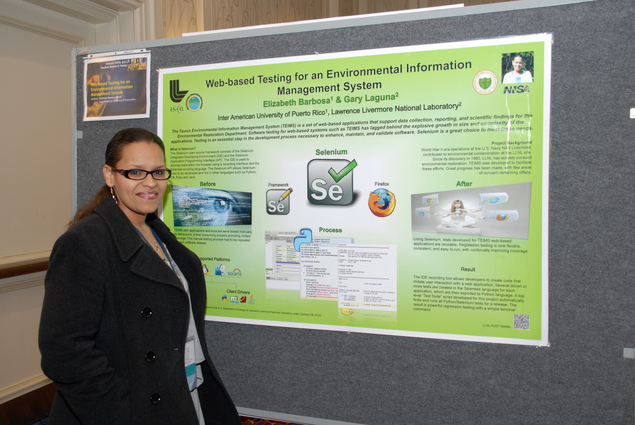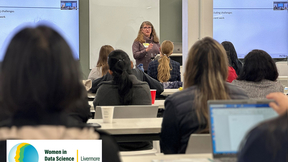Lab plays key role in Richard Tapia Diversity in Computing Conference
 (Download Image)
Elizabeth Barbosa, a student in Computation, presented her poster "Web-based Testing for an Environmental Information Management System" at the Richard Tapia Diversity in Computing Conference in Washington D.C. earlier this month.
(Download Image)
Elizabeth Barbosa, a student in Computation, presented her poster "Web-based Testing for an Environmental Information Management System" at the Richard Tapia Diversity in Computing Conference in Washington D.C. earlier this month.
Over the last dozen years, the conference has served as a catalyst for bringing researchers and professionals from populations underrepresented in the computing profession into the field. The program includes plenary speakers, panel discussions, hands-on workshops, birds-of-a-feather meetings, professional networking and hundreds of informal conversations in the hallways and over meals.
"Playing a high profile role in the conference gives the Laboratory great visibility and helps us attract top talent from the diverse pool of attendees," said Tony Baylis, a program manager in Computation who has participated in the conference since 2003. "Because of the support of senior management at the Lab and involvement of staff, the Laboratory is now seen as a leader in its commitment to diversity and inclusion. LLNL is seen as a top supporter by students and campuses across the country."
LLNL managers and researchers who have provided support and otherwise participated in the conference include: Dona Crawford, Roger Werne, Trish Damkroger, Ron Schmucker, Celeste Matarazzo, Gary Laguna, Kelly Crawford, Kevin Griffin, Don Frederick, Gavin Bell, Greg Bronevetsky, Dean Williams and Jaime Van Randwyk. Darlene Yazzie and Juan Hernandez also provided staff support.
A number of conference attendees who came to Livermore, some through student programs, have become full-time employees, including Edgar Leon, Carla Hardy and Joel Martinez. Raul Viera, slated to be a new hire in July, won an award for best undergraduate poster. Viera was one of four Computation students who participated in the poster session. The others were Elizabeth Barbosa, Myles Nicholson and Nishmar Cestero.
"By supporting conferences such as the Richard Tapia Celebration of Diversity in Computing we strengthen the Laboratory," said Dona Crawford, associate director for Computation. "This conference provides one more pipeline for some of the best science, technology, engineering and mathematics talent available today."
Attendees at this year's conference heard from an all-star lineup of speakers, including Annie Anton of Georgia Tech, Vinton Cerf of Google, Theresa Maldonado of the National Science Foundation, Jeanine Cook of New Mexico State University, Hakim Weatherspoon of Cornell University, Armando Fox of the University of California, Berkeley, Anita Jones of the University of Virginia and the Honorable Dot Harris of the U.S. Department of Energy.
Other national labs supporting the conference included Lawrence Berkeley and Oak Ridge.
According to registration information, the 2013 conference is the most diverse computing research meeting both in gender -- 50 percent women/50 percent men -- as well as race and ethnicity -- 71 percent African American, Hispanic, Native American or Pacific Islander. This year's conference was held in Washington, D.C. from Feb. 7-10. Next year's conference will be in Seattle, Feb. 5-8.
Also visiting this year's conference was U.S. Chief Technical Officer Todd Park, who reports to President Obama.
The Tapia conference has a tradition of providing a supportive networking environment for under-represented groups across the broad range of computing and information technology, from science to business to the arts to infrastructure. The Tapia conference is organized by the Coalition to Diversify Computing, sponsored by the Association for Computing Machinery, and in cooperation with the IEEE Computer Society and the Computing Research Association.
Contact
Donald B Johnston[email protected]
925-423-4902
Tags
HPC, Simulation, and Data ScienceComputing
HPC Innovation Center
Featured Articles







